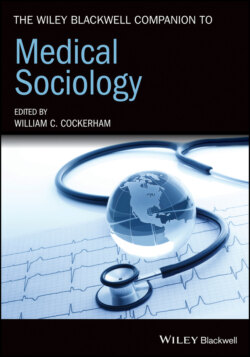Читать книгу The Wiley Blackwell Companion to Medical Sociology - Группа авторов - Страница 21
RECOMMENDATIONS
ОглавлениеIn this section, we offer several recommendations for a more refined and directed conceptualization of the field. Some of our suggestions stem from our core argument that the sociological study of health could use a more contemporary disciplinary structure that adequately represents the field. Others include more practical recommendations about graduate education. These recommendations are merely offered as possible directions for the field of medical sociology. Although these recommendations occurred to us, we realize they may be controversial to some. Our intent is to inspire even more discussions concerning the implications of our proposed model.
Recommendation #1. Explore explicit disciplinary structures. It is difficult to develop as a field when our disciplinary structure is little more than a collection of concepts and topics under several field identifiers (e.g. Medical Sociology, Sociology of Medicine, Sociology of Health and Illness, Sociology of Health, and Health Sociology). It is true that our field has developed in significant ways. We have accumulated an impressive body of research. We have multiple journals. We have the second largest section in the American Sociological Association. However, our field is underdeveloped in other ways that are also important. As indicated by the range of labels and definitions used to describe our field, we have little consistency in research identities across researchers and in the ways we define the purview of our field. Because medical sociology is often defined in terms of concepts and topics that are often non-unique to our field (e.g. health, illness, medicine, social factors), Sociology in general and other health sciences are often unclear about the nature of our work or our unique contributions to the study of health and medicine. Disciplinary structures that define Medical Sociology in terms of major subfields and key contributions is an important step toward a more efficient and contemporary representation of our unique contributions to the study of health.
Recommendation #2. Consider consistent research identities. It is difficult to develop as a field without consistent research identities. As medical sociologists, we should consider identifying with one or more of the four major subfields. The consistent use of shared labels will eventually help to crystalize our disciplinary structure and to better demonstrate our contributions. It is insufficient to simply identify the subfields that represent research conducted in medical sociology. Identifying with major subfields reinforces the structure of the field by consistently signifying the nature of our work. This recommendation in no way limits the ways in which researchers might identify themselves or their work. For example, in some circumstances, it may make sense to claim expertise in health care or medicalization. Our recommendation is that researchers also recognize where their interests fit into a broader disciplinary structure that distills our major subfields and key contributions to the sociological study of health and medicine.
Recommendation #3. Consider consistent graduate program identities. One potential strategy is for graduate programs to consider identifying as comprehensive or focused. Comprehensive graduate programs would represent the field as a whole. Focused graduate programs would represent one or more specific subfields. Precise program identities would contribute to more efficient graduate programs by dictating hiring decisions (who to hire), graduate recruitment strategies (who to recruit), and graduate curriculum (which courses and area examinations). For example, comprehensive programs could choose to require area examinations that cover the field whereas focused programs could require area examinations that correspond to selected subfields. Doing so would align examinations with faculty expertise, which is consistent with the American Sociological Association’s Code of Professional Ethics.
Recommendation #4. Reconsider the role of Sociology in Medicine. Although we have excellent graduate programs in Social Epidemiology, Social Psychology of Health and Illness, and Sociology of Medicine, Sociology in Medicine is currently unrepresented in the graduate landscape. What role should Sociology in Medicine have in graduate education? Each year our graduates go on to work in medical schools, hospitals, government organizations, and health research firms. Non-academic job placements are likely to become even more common as the academic job market shrinks. We encourage conversations around the question of dedicating graduate courses or entire graduate programs to training graduate students to work in inter-disciplinary, inter-professional, and applied contexts. “Medical sociology’s usefulness beyond its informative and educational function” has been called into question because our graduate programs are “still rather didactic and merely educational, not applied” (Constantinou 2015). Recent job ads for positions in institutions of medicine specify “a PhD in Psychology or Sociology with a specialty in Health Psychology or Medical Sociology.” However, postings that encourage applications “from candidates in all disciplines… including the social and behavioral sciences…” are more and more common. Complicating this picture is a market that increasingly highlights skill sets rather than disciplinary background.
We also encourage conversations about how we can best support the long-term careers of sociologists placed in institutions of medicine. We may need to develop ways of embedding our graduates in ongoing training programs that are formed and nurtured not by medicine, but by sociology. When our graduates become disconnected from Sociology, the students we train so well may not remain sociologists for long. The Medical Sociology section of the American Sociological Association might consider devoting additional sessions and activities to applied medical sociology to maintain connections with sociologists in practice settings. Discussions along these lines could eventually facilitate the placement of even more graduate students in sparse hiring climates and increase our status across the health sciences. Success in these areas could lead to more resources being devoted to sociology programs in general.
